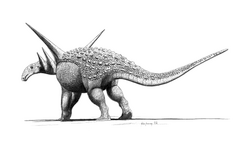Sauropelta facts for kids
Quick facts for kids SauropeltaTemporal range: Lower Cretaceous
|
|
|---|---|
 |
|
| Scientific classification | |
| Kingdom: | |
| Phylum: | |
| Class: | |
| Superorder: | |
| Order: | |
| Suborder: | |
| Infraorder: | |
| Family: | |
| Genus: |
Sauropelta
|
Sauropelta was a cool, armored dinosaur that lived a long, long time ago during the Lower Cretaceous period. Imagine a dinosaur covered in tough, bony plates and spikes – that was Sauropelta! It was a bit like its famous cousin, Ankylosaurus, but without the big bony club at the end of its tail.
Scientists know a lot about Sauropelta because many of its fossils have been found. These fossils help us understand what this amazing creature looked like and how it lived.
Contents
Meet Sauropelta: An Armored Dinosaur
Sauropelta was a type of dinosaur called a nodosaurid. These dinosaurs were known for their heavy armor. Sauropelta is one of the earliest nodosaurids we know about. Most of its remains are from about 115 to 110 million years ago.
Where Did Sauropelta Live?
Fossils of Sauropelta have been discovered in the U.S. states of Wyoming and Montana. There might even be some in Utah. Finding fossils in these places helps us know where this dinosaur roamed millions of years ago.
How Big Was Sauropelta?
Sauropelta was a medium-sized nodosaurid. It measured about 5 meters (16.5 feet) long. That's roughly the length of a small car! Its tail was super long, making up about half of its total body length.
Even though it wasn't as big as some other dinosaurs, Sauropelta was very heavy. It weighed around 1,500 kilograms (3,300 lb). That's about as much as a small car or a modern black rhinoceros! Its heavy armor added a lot to its weight.
Sauropelta's Amazing Armor
The extra weight of Sauropelta came from its incredible armor. This armor covered its body, protecting it from predators. It even had large, sharp spines sticking out from its neck.
What Did Its Head Look Like?
Like other armored dinosaurs, Sauropelta had thick, triangular bony plates, called scutes, around its eyes. These plates protected its eyes from above, below, and behind.
Its mouth had leaf-shaped teeth in both its upper and lower jaws. These teeth were perfect for cutting and chewing plants. Scientists believe the front of its skull had a tough, keratinous beak, similar to a turtle's beak, which it used to snip off plants.
Images for kids
See also
 In Spanish: Sauropelta edwardsorum para niños
In Spanish: Sauropelta edwardsorum para niños
 | Kyle Baker |
 | Joseph Yoakum |
 | Laura Wheeler Waring |
 | Henry Ossawa Tanner |






